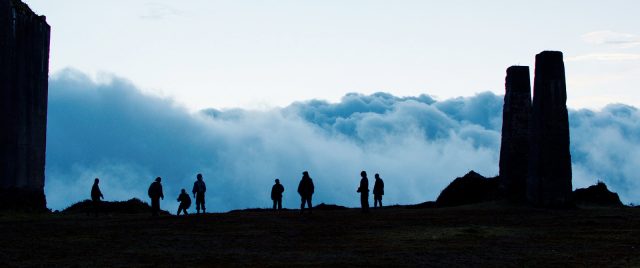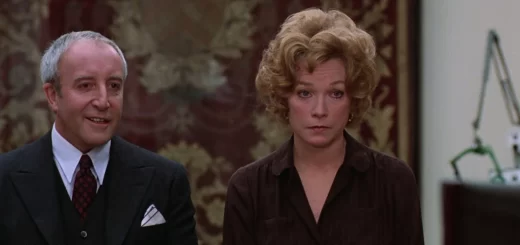Monos: Lords of Chaos, by David Bax

Technically, the aspect ratio of Alejandro Landes’ confrontational, unnerving Monos is 2.35:1. But the often crepuscular cinematography of Jasper Wolf makes the frame shapeless and dissolute, informed by the limbo between light and dark that creeps in around the edges. Monos is as destabilizing and dread-inducing in its aesthetics as it is in pretty much every other way.
In an unspecified but Spanish-speaking part of the world at some point in time roughly contemporaneous to our own, a bivouac of child soldiers, mostly teenagers, live on a mountaintop. They are well-armed and under-supervised. Their only tasks seem to be the care of a milk cow and the guarding of an American hostage (Julianne Nicholson), a doctor of undefined specialization.
Monos gives us no background on who these kids are or how they came to be enlisted in this paramilitary unit. Nor does it tell us what ongoing skirmish they’re in the middle of, even after mortar shells start exploding around them. Daringly, it also denies us a resolution. In essence, Monos is all second act, sustaining tension and intentionally sowing confusion, the same emotion many of these boys and girls are feeling.
Where Landes and co-screenwriter Alexis Dos Santos do provide distinction is among the characters. Among the cast, only Nicholson and Moises Arias (as a soldier named Bigfoot) will likely be recognizable to Americans but each member of the unit is given not just a catchy codename (Rambo, Wolf, Lady, Swede, Smurf, Dog, Boom Boom) but a personality defined largely by their unique fears and insecurities.
Without parents or creature comforts, the children are left to focus on bare necessities. Monos‘ most intriguing gambit is its attempt to define what those are. Food and water rank high on the list, obviously, but Landes is more concerned with companionship and, especially among the budding hormones of the teen characters, touch and sex. Physical and romantic relationships are codified within the unit but that effort to apply discipline is laughable. The fact that emotions are messy is not a new insight but, in the knife’s edge, gun-toting existence seen here, it takes on new dangers.
These relationships, these responsibilities and all that weaponry don’t negate the fact that these are still kids, though. In their current situation, the stakes couldn’t be higher but not only do these characters not know what those stakes are, they are too inexperienced yet to appreciate them in any case. Monos is harrowing and experiential but most potent in its comparison between children and soldiers of any age in impersonal, modern warfare. If you don’t know what you’re fighting for, what’s the difference between war and playing at war?






























